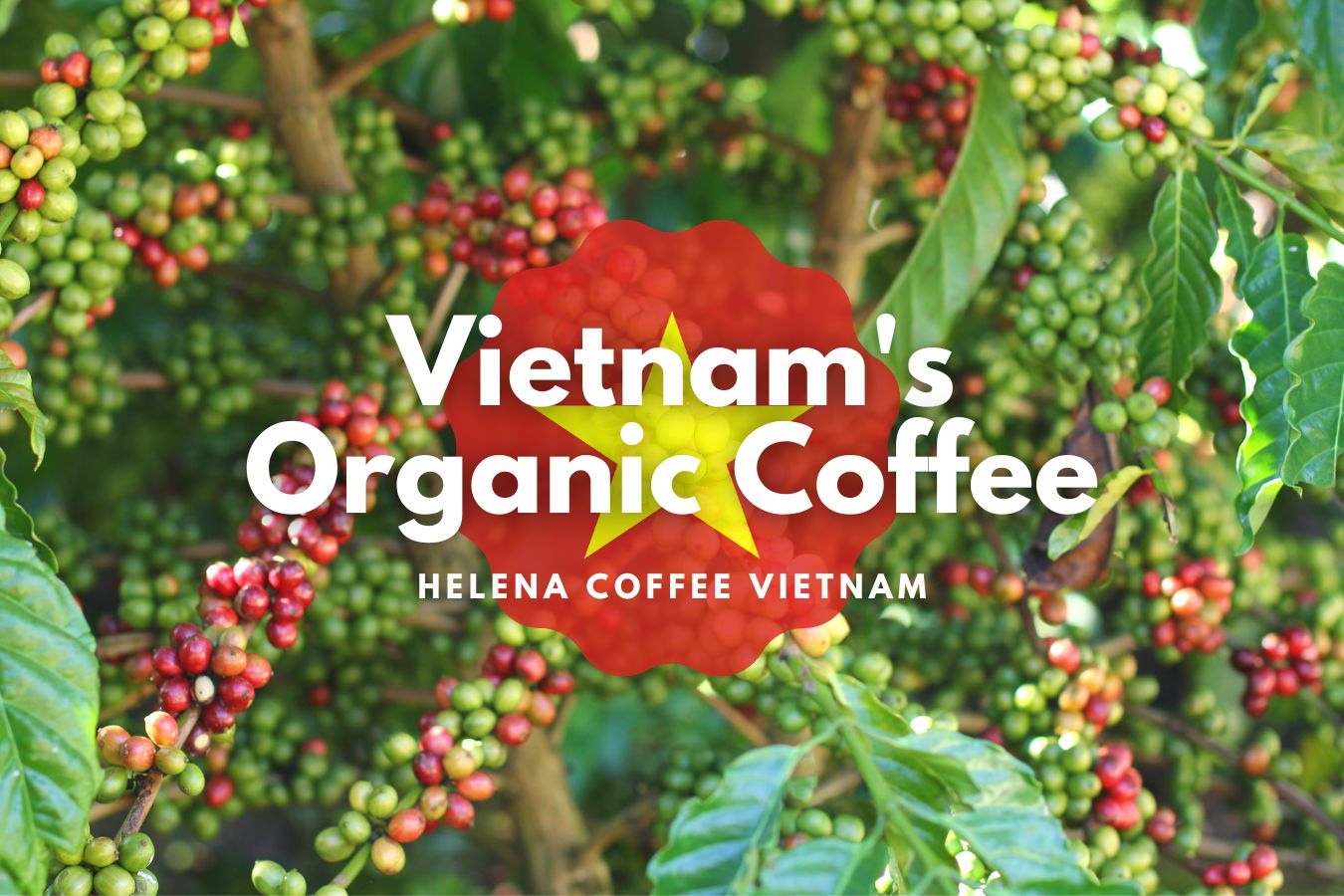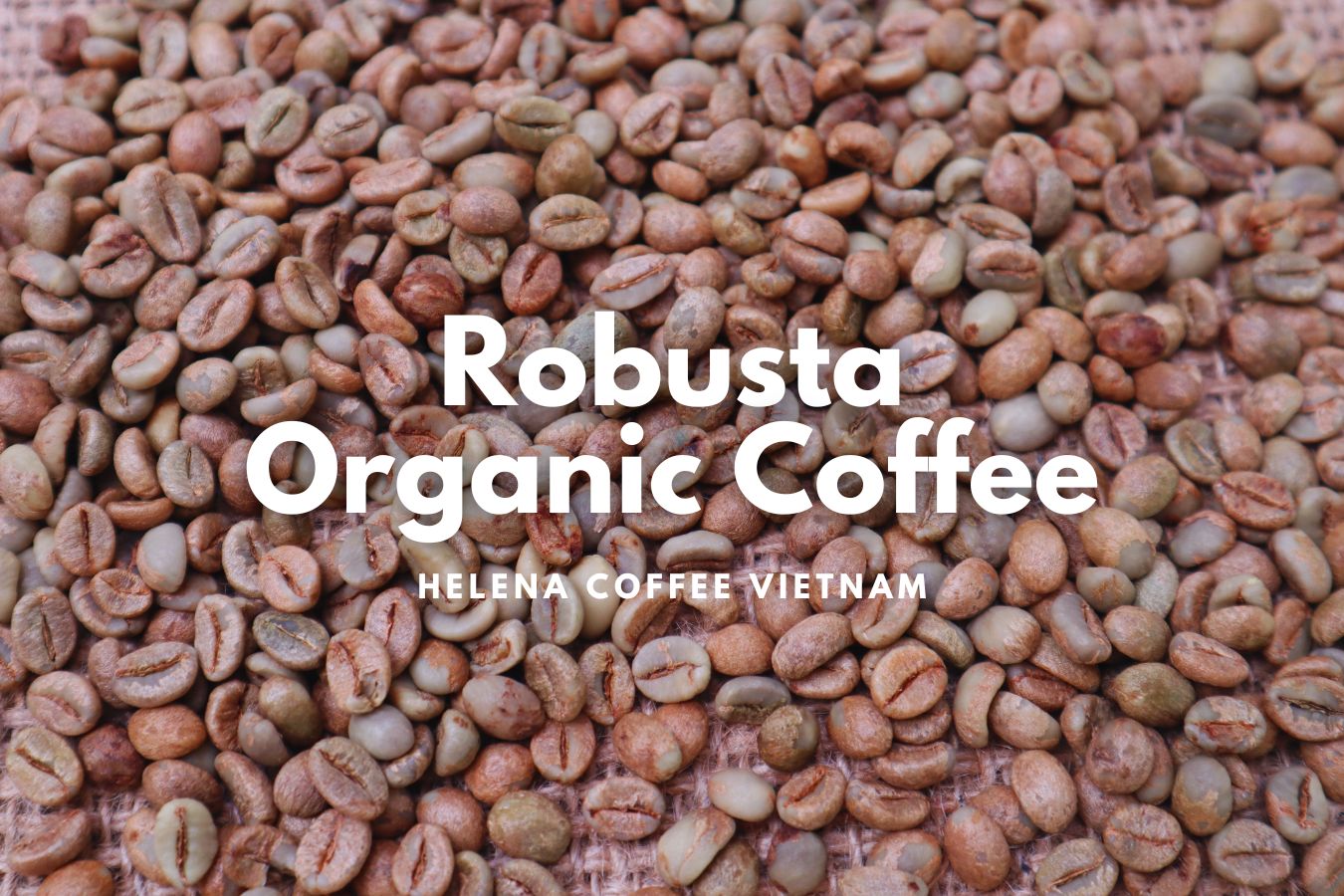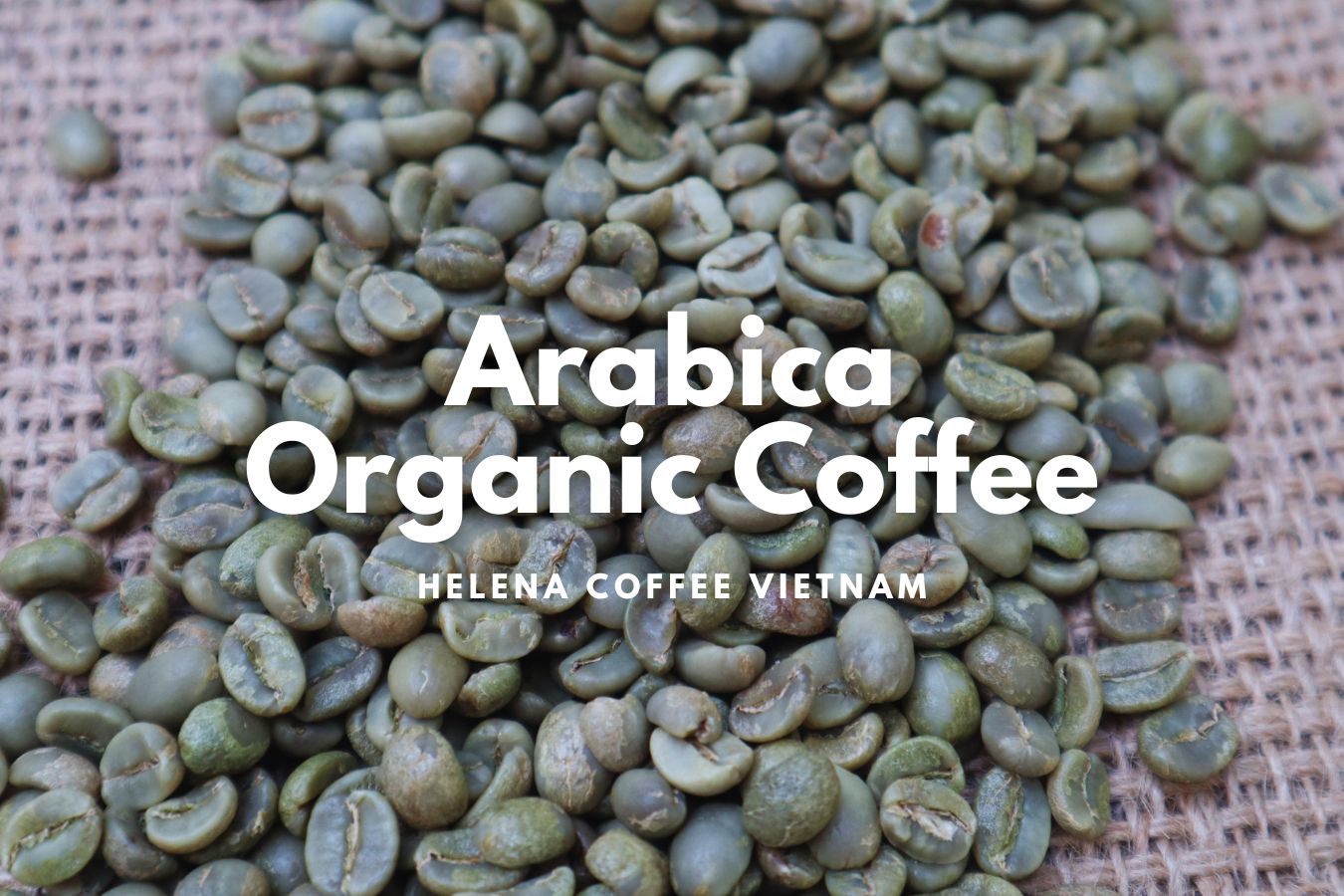
Vietnam’s Organic Coffee: Welcome to a world of exquisite flavors and rich aromas, where every sip tells a story of sustainable farming practices and age-old traditions. Vietnam, a nation renowned for its robust coffee industry, is now offering a new and delightful experience to coffee connoisseurs worldwide: organic coffee. This guide will take you on a flavorful adventure, unveiling the unique characteristics of Vietnam’s organic coffee, its environmental and social impact, and how it’s capturing the hearts of coffee lovers everywhere. So, please sit back, grab your favorite mug, and embark on this journey together!
The Rise of Organic Coffee in Vietnam
Vietnam has a long and storied history of coffee production, dating back to the 19th century when French colonists first introduced coffee plants. For decades, Vietnam has been known primarily for its robust coffee production, consistently ranking as one of the world’s largest producers of this variety.
However, in recent years, there has been a significant shift towards organic coffee production, particularly in the highland regions of the country. This growth can be attributed to the increasing global demand for sustainable and environmentally friendly products and the recognition of Vietnamese organic coffee’s unique flavors and qualities.
Factors Contributing to the Popularity of Organic Coffee in Vietnam
- Growing Consumer Demand: As more and more consumers become aware of organic products’ environmental and health benefits, the demand for organic coffee has steadily risen. This growing interest has spurred local farmers and producers to adapt their farming practices and focus on organic coffee cultivation.
- Government Support and Initiatives: The Vietnamese government has recognized the potential of organic coffee as a valuable export product and has introduced various initiatives to support its growth. These include providing financial assistance, training, and resources to help farmers transition to organic farming methods and promoting organic coffee export through international trade fairs and marketing campaigns.
- Environmental Awareness and Sustainability: With the increasing awareness of climate change and environmental issues, many farmers and producers in Vietnam have turned to organic coffee cultivation to reduce their ecological footprint. Organic farming practices help conserve natural resources, maintain soil fertility, and protect local ecosystems.
- Unique Flavors and High Quality: Organic coffee from Vietnam is known for its distinct taste and aroma, which sets it apart from conventional coffee. The careful attention to sustainable farming practices, combined with the diverse growing conditions in Vietnam’s coffee-producing regions, produces a high-quality product that appeals to coffee connoisseurs worldwide.
In conclusion, the rise of organic coffee in Vietnam can be attributed to a combination of factors, including increasing consumer demand, government support, environmental awareness, and the unique flavors and quality of the product. As a result, Vietnam’s organic coffee industry is poised for continued growth and success in the global market.
Vietnam’s Organic Coffee Regions in Helena Coffee
An Overview of the Major Coffee-Producing Regions in Vietnam
Vietnam’s diverse geography and climate create the perfect environment for growing high-quality organic coffee. Helena Coffee sources its organic coffee beans from various regions nationwide, each with unique characteristics and flavor profiles. Some of the significant coffee-producing parts in Vietnam include:
- Central Highlands: The Central Highlands region, comprising provinces such as Lam Dong, Dak Lak, and Gia Lai, is the heart of Vietnam’s coffee industry. With its high altitude, fertile soil, and cool climate, this region is ideal for cultivating arabica and robusta coffee varieties. Helena Coffee works closely with farmers in this area to ensure the production of top-quality organic coffee.
- Dalat: Often referred to as the “City of Eternal Spring,” Dalat is picturesque in the Central Highlands. Famous for its cool climate, fertile volcanic soil, and high altitude, Dalat is renowned for producing exceptional arabica coffee beans. Helena Coffee sources premium organic coffee from this region, known for its bright acidity, fruity notes, and delicate floral aroma.
- Son La: Located in northwest Vietnam, Son La is a mountainous province with a cooler climate, making it suitable for growing high-quality Arabica coffee. Organic coffee from Son La is characterized by its medium body, balanced acidity, and chocolatey, nutty flavors.
Unique Characteristics of Organic Coffee from Different Regions
Each coffee-producing region in Vietnam imparts unique characteristics to the beans grown there, resulting in diverse flavor profiles that appeal to a wide range of palates. Organic coffee beans from Vietnam typically share some common traits, such as a strong emphasis on environmental sustainability and adherence to organic farming practices.
Central Highlands organic coffee is known for its bold, full-bodied flavor with a hint of chocolate and earthy undertones. In contrast, Dalat’s organic arabica coffee offers a more delicate, floral taste with bright acidity and fruity notes. On the other hand, organic coffee from Son La is characterized by its medium body, balanced acidity, and distinct chocolatey, nutty flavor.
By sourcing organic coffee from various regions across Vietnam, Helena Coffee can offer a diverse range of high-quality, sustainably produced coffee beans that cater to the preferences of coffee lovers worldwide.
Organic Coffee Production and Certification
Organic Farming Practices in Vietnam
Vietnam’s organic coffee industry is proliferating, driven by increasing demand for sustainably produced and environmentally friendly products. Organic farming practices play a crucial role in maintaining the health of the soil, protecting biodiversity, and reducing the use of synthetic chemicals that can harm both the environment and the final product.

In Vietnam, organic coffee farmers adhere to strict guidelines to ensure their coffee beans are grown without synthetic fertilizers, pesticides, herbicides, or genetically modified organisms (GMOs). Instead, they rely on natural methods to maintain soil fertility, such as crop rotation, composting, and using organic fertilizers derived from animal manure and plant matter.
Additionally, organic coffee farmers often use shade-grown techniques, planting coffee trees under the canopy of native trees, which helps to preserve local ecosystems and support biodiversity. Shade-grown coffee plants also benefit from a more balanced and sustainable growth pattern, which can result in a higher-quality product.
The Importance of Certification and the Role of Certifying Organizations
Certification is essential to guarantee the authenticity and quality of organic coffee products. It assures consumers that their coffee has been produced per strict organic standards and has undergone a thorough inspection process.
Several organizations, such as Control Union, IMO Control, and ECOCERT, play a crucial role in certifying organic coffee in Vietnam. These certifying bodies inspect and verify that coffee producers adhere to established organic standards, from cultivation and processing to packaging and distribution.
To obtain organic certification, coffee producers must undergo a rigorous evaluation process, which includes on-site inspections, soil and water testing, and a review of the farm’s organic management plan. Once certified, producers must maintain their organic practices and undergo periodic inspections to ensure ongoing compliance with the certification requirements.
In conclusion, organic coffee production in Vietnam relies on sustainable farming practices and strict certification processes to ensure the highest quality product for consumers. By choosing certified organic coffee from Vietnam, you are enjoying a delicious and flavorful beverage and supporting environmentally responsible practices and the livelihoods of local farmers.
The Environmental and Social Impact of Organic Coffee: Nurturing Nature and Communities
Organic coffee production offers coffee enthusiasts a high-quality, flavorful beverage and brings about significant environmental and social benefits. By adopting organic farming practices, coffee producers contribute to the preservation of ecosystems and the well-being of local communities.
Environmental Benefits of Organic Coffee Farming
- Biodiversity Conservation: Organic coffee farms often incorporate shade-grown cultivation methods, which help maintain and support diverse ecosystems. By preserving the native flora and fauna, these farms create habitats for various plant and animal species, fostering a healthy and balanced environment.
- Soil Health: Organic coffee farming avoids using synthetic fertilizers, pesticides, and herbicides. Instead, natural fertilizers, such as compost and animal manure, nourish the soil. This practice improves soil fertility, reduces erosion, and promotes the growth of beneficial microorganisms.
- Reduced Water Pollution: Organic farming methods minimize the risk of water pollution by avoiding harmful chemicals. This practice helps protect nearby water sources, such as rivers, lakes, and groundwater, ensuring clean water for local communities and the surrounding ecosystem.
- Climate Change Mitigation: Organic coffee farms often have a lower carbon footprint than conventional farms due to the absence of synthetic inputs and sustainable farming techniques. Additionally, shade-grown coffee farms act as carbon sinks, absorbing CO2 from the atmosphere and helping mitigate climate change.
Social Impact of Organic Coffee Production
- Improved Livelihoods for Farmers: Organic coffee production typically produces higher prices for farmers due to the growing demand for sustainably produced coffee. By receiving fair compensation for their efforts, coffee farmers can improve their living conditions and invest in their communities.
- Healthier Communities: By avoiding harmful chemicals, organic coffee farming contributes to a healthier environment for local communities. Farmers and their families are less exposed to toxic substances, reducing the risk of health issues related to chemical exposure.
- Empowerment and Education: Many organic coffee initiatives prioritize education and capacity-building for local farmers. By providing training and resources on organic farming practices, farmers are empowered to adopt sustainable methods and contribute to the long-term development of their communities.
- Preservation of Cultural Heritage: Organic coffee farming often goes hand-in-hand with traditional agricultural practices. By encouraging the continuation of these methods, organic coffee production helps preserve the cultural heritage of coffee-producing regions.
In conclusion, organic coffee production’s environmental and social impact goes beyond delivering a delicious cup of coffee. By embracing sustainable farming practices, coffee producers contribute to a healthier planet and a better quality of life for local communities, ensuring a brighter future for both people and nature.

Helena Coffee: A Leading Supplier of Organic Vietnamese Coffee – Sustainable Practices, Exceptional Quality
Helena Coffee, a well-established coffee supplier, is renowned for its dedication to providing high-quality organic Vietnamese coffee to customers worldwide. With a deep understanding of the importance of sustainable practices and preserving the unique characteristics of Vietnamese coffee, Helena Coffee takes pride in offering exceptional organic coffee beans that satisfy the discerning taste buds of coffee enthusiasts.
Commitment to Organic Practices and Sustainability:
Helena Coffee’s commitment to organic practices and sustainability is at the core of its business philosophy. By partnering with local coffee farmers who adhere to strict organic farming methods, Helena Coffee ensures that their coffee beans are grown without synthetic fertilizers, pesticides, or herbicides, ultimately contributing to a healthier environment and a more flavorful cup of coffee.
Sustainability is a top priority for Helena Coffee. They strive to minimize environmental impact by implementing eco-friendly practices throughout their supply chain. Additionally, Helena Coffee supports local communities by promoting fair trade practices and investing in educational programs for farmers to enhance their knowledge of sustainable and organic farming techniques.
Range of Vietnam’s Organic Coffee Beans Offered:
Helena Coffee offers a diverse range of organic Vietnamese coffee beans, catering to the varying preferences of coffee lovers. Their selection includes:
- Organic Arabica Coffee: Grown at high altitudes in the central highlands of Vietnam, Helena Coffee’s organic Arabica beans boast a bright acidity, complex flavors, and a pleasant aroma.
- Organic Robusta Coffee: Known for its bold taste and higher caffeine content, Helena Coffee’s organic Robusta beans are sourced from the fertile lowlands of Vietnam, offering a rich and robust coffee experience.
- Organic Specialty Blends: Helena Coffee also provides a variety of specialty blends, combining the unique characteristics of different coffee beans to create well-balanced and distinctive flavor profiles.
By choosing Helena Coffee as your trusted supplier of organic Vietnamese coffee, you can enjoy the authentic taste of Vietnamese coffee while supporting sustainable and ethical practices that benefit both the environment and local communities. Experience the rich flavors and captivating aromas of Helena Coffee’s organic offerings, and embark on an unforgettable coffee journey.
Reference source:
A series of articles on certification on coffee published by Cafe Imports – An importer and independent developer of green specialty coffee, headquartered in Minneapolis, Minnesota.
- CAFEIMPORTS: A Series about Certifications, part 1 – Organics Posted on November 11th, 2020